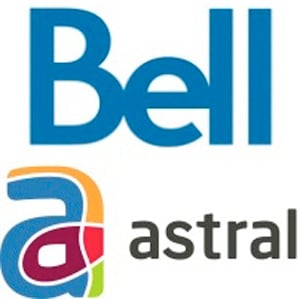
Summer is rarely a time of heated broadcast policy battles, but the proposed Bell-Astral merger has generated considerable public attention and fostered a growing war of words between Bell and groups that have banded together under the "Say No to Bell" banner.
The anti-merger campaign, supported by consumer groups as well as several leading cable and telecom companies, has garnered tens of thousands of signatures on an online petition and the Canadian Radio-television and Telecommunications Commission has received more than 1,700 submissions on the deal.
Despite the mounting public opposition, stopping the $3 billion merger remains a longshot as none of the big three -- government, the CRTC, or the Competition Bureau -- seems ready to call it off.
The government has remained silent on the matter, suggesting it does not want to wade into the transaction, particularly when it is struggling to address the proposed Nexen purchase by Chinese interests.
Leading the world in media oligopoly
The CRTC will probably pressure Bell to make some adjustments to the deal, but squashing it altogether is unlikely given the many prior approvals of media mergers. Much of the CRTC hearing will be devoted to debate over the "tangible benefits" package, with cultural groups trading short-term gain for long-term pain by supporting the merger in return for a bigger payday.
The most obvious benefits package target is Bell’s proposal to spend tens of millions on infrastructure development in the north, which seems certain to be rejected. Indeed, a cynic might suggest that Bell added the proposal with the expectation the CRTC would kill it, thereby allowing the Commission to appear responsive to public criticism while leaving the bulk of the transaction untouched.
The Competition Bureau could become active on the issue given its previous willingness to closely examine the Quebec media market, but with imminent changes in bureau leadership and the expected sale of several Astral radio stations to third parties, it may reluctantly give the deal a pass.
Should the Bell-Astral merger receive the required regulatory approvals, Canada would be left with one of the most concentrated media markets in the world, with a single company controlling a remarkable array of broadcast television networks, radio stations, specialty channels, as well as telecom, satellite, and Internet services.
Three ways to diversify media ownership
While there will be no easy answers to address media convergence concerns, several policy reforms may help build the foundation for a more competitive Canadian market.
First, the government should remove foreign ownership restrictions on broadcasting companies. While this raises obvious cultural sensitivities, there is little reason to believe that Canadian-owned broadcasters are any more likely to air Canadian programming than their foreign counterparts.
All broadcasters invariably adopt whatever strategy maximizes revenues without regard for the origin of the content. In many instances, this means cheaper U.S. programming is preferred. Canadian content regulations ensure a baseline level of support for Canadian programming and there is little evidence that Canadian businesses are more likely to comply with these rules than foreign companies.
Second, Canada's net neutrality rules, which restrict the ability of network operators to discriminate against competitive content or grant preferential treatment to their own programming, require tougher enforcement. Recent studies suggest that Canadian Internet providers are still using throttling technologies that render it more difficult for Internet-based new media companies to compete with the established broadcast giants.
Third, the Competition Bureau and the CRTC must be vigilant in ensuring that the new Bell entity does not unfairly leverage its position by refusing to deal with competitors. The CRTC has waded into this issue in the past and will undoubtedly be called upon to do so again should the market become even more concentrated. ![]()















Tyee Commenting Guidelines
Comments that violate guidelines risk being deleted, and violations may result in a temporary or permanent user ban. Maintain the spirit of good conversation to stay in the discussion.
*Please note The Tyee is not a forum for spreading misinformation about COVID-19, denying its existence or minimizing its risk to public health.
Do:
Do not: